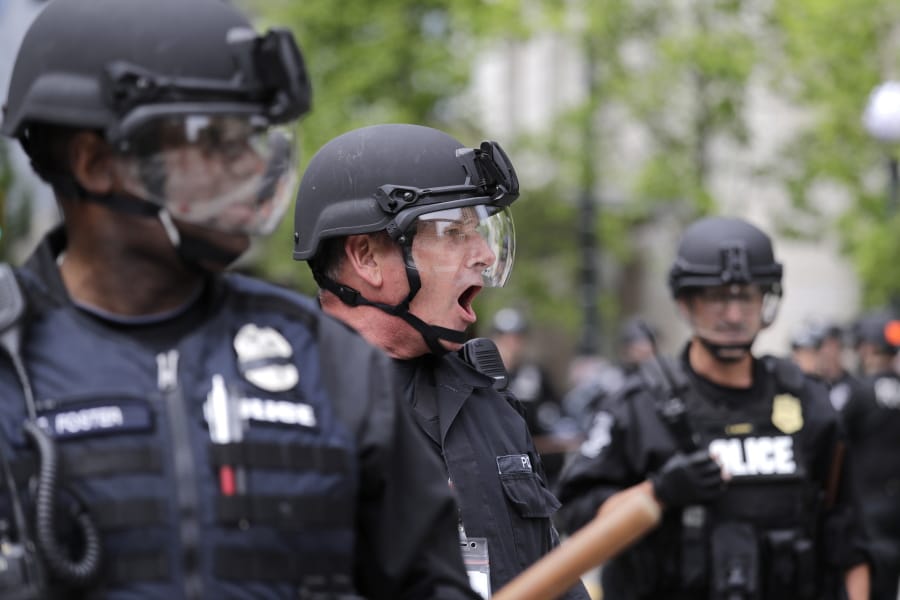SEATTLE — A judge on Thursday elaborated on a series of tasks and deadlines the city of Seattle and its Police Department must complete before being fully freed from more than 11 years of federal oversight.
U.S. District Judge James Robart ruled this week the SPD and city have achieved “full, sustained and lasting compliance” to the bulk of the requirements detailed in a 2012 settlement agreement over a Department of Justice investigation that found evidence Seattle officers routinely used excessive force and showed signs of biased policing.
Robart memorialized his findings Thursday in an 11-page order providing the SPD a framework to address two key issues he’ll retain jurisdiction over: the city’s crowd-control policy and the vexatious topic of officer accountability.
The order makes clear the latter issue is tied to contract negotiations between the city and rank-and-file Seattle Police Officers Guild, which have been deadlocked for two years.
“The court is immensely proud of the efforts SPD has undertaken since this matter began in 2012,” Robart wrote. But the city still needs to come up with a compliant crowd-management plan for protests and other large events, he said, and the “parties also agree that the city has more work to do in ensuring that there exists a sustainable system of review and accountability.”
While both the DOJ and city had asked Robart to agree to a modified “compliance agreement” addressing those issues, he said the longstanding consent decree, with its stringent reporting standards and oversight, will remain in effect in those areas.
Robart’s conclusion that the city has met the requirements of the consent decree in every other aspect, including use of force, crisis intervention, biased policing, supervision and the establishment of strong oversight, was met with praise by the DOJ’s Civil Rights Division and caution by civil liberty advocates and police reformers.
“As we said earlier, this move does not mean ‘mission accomplished’ for the Seattle Police Department or for the community the department is sworn to protect,” said Enoka Herat, the policing and immigration policy director for the American Civil Liberties Union of Washington.
Herat pointed to recent revelations that the SPD kept a mock tombstone and a political flag in a precinct break room and that data compiled by the court’s monitor last year — also referenced as troubling by Robart — indicated officers are more likely to stop, detain and use force against people of color.
“The data shows SPD still engages in discriminatory policing and actions that undermine community trust,” Herat said in a statement, adding that Robart’s ruling still provides residents the chance to voice concerns about officer discipline and accountability — and insist on “constitutional approaches to crowd control.”
Assistant Attorney General Kristen Clarke, who heads the Civil Rights Division in Washington, D.C., had appeared alongside Mayor Bruce Harrell in March to proclaim the SPD a “transformed organization.” On Thursday, Clarke said Robart’s order “gives the city and police department the ability to focus on the areas that need additional attention.”
The judge’s order requires the SPD to finish developing new crowd management policies, which he and independent monitor Antonio Oftelie must approve.
Now that Seattle’s overarching use-of-force policy is no longer governed by the federal court, Robart said the city also must update him on the status of its compliance with a new state law requiring the newly formed Office of Independent Investigations to investigate any use of deadly force.
The SPD has an internal Force Investigation Team — approved by the court — that’s required to investigate uses of serious force, setting up a potential conflict.
Regarding accountability, Robart ordered the department to improve and analyze the collection and reporting of race data in stops, detentions and uses of force by SPD officers, and “provide public access to these reports and any other data” city oversight entities identify as critical for transparency.
Robart acknowledge he has no role in collective bargaining between the city and SPOG, but he reiterated an interest in the outcome of the union negotiations.
“It is critical for the court to understand whether and how the outcome of the collective bargaining process affects SPD’s accountability and review systems,” the judge wrote. He ordered the city to report back after reaching an agreement and explain how the contract affects crowd control and officer accountability before he’ll consider ending his oversight.
The city was in this position once before, not long after the City Council in 2017 passed a landmark police accountability ordinance addressing many of the issues that remain before the court today.
However, the City Council adopted a new police contract in 2019 that undermined the ordinance, culminating in an incident in which the department was, after arbitration, ordered to rehire an officer fired for punching a handcuffed woman in the face.
That incident led Robart, citing a history of defiance to the agreement by rank-and-file officers, to find in 2019 that the SPD had fallen partially out of compliance with the federal settlement agreement.



